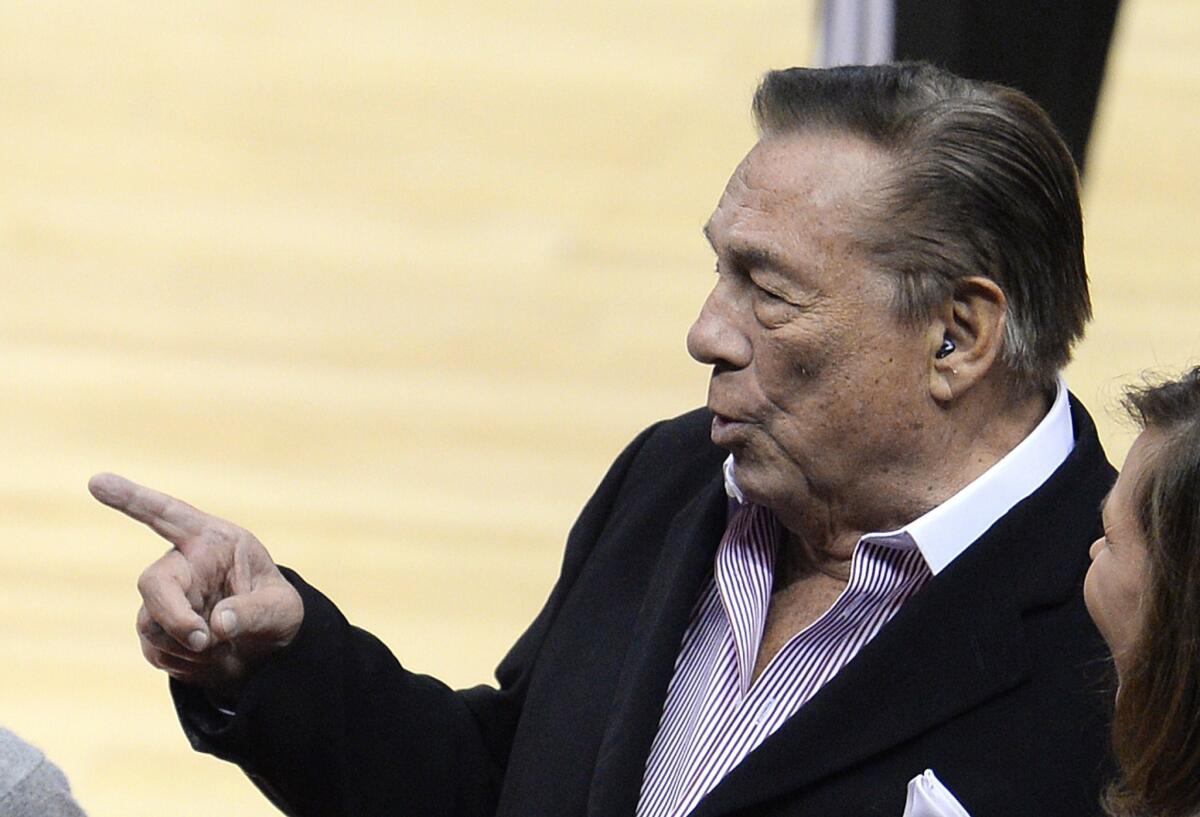Donald Sterling could tie Clippers sale up in court

If NBA owners ultimately vote to oust Donald Sterling and the embattled Clippers boss decides to fight back, the resulting litigation could drag on for years and set a precedent for American professional sports, legal experts said Wednesday.
While Sterling appears to face long odds in challenging his lifetime ban and $2.5-million fine, legal experts and lawyers who have faced the NBA in court see a more viable case when it comes to opposing a forced sale.
Sterling could seek an immediate injunction, then file suit raising breach of contract or antitrust claims.
If that happens, the courts will find little or no precedent for a team owner facing expulsion because of offensive comments about race.
âWeâre in a part of sports law where there isnât a playbook,â said Michael McCann, a sports law professor at the University of New Hampshire School of Law. âWeâre in uncharted territory.â
NBA Commissioner Adam Silver announced the fine and ban Tuesday and said he would encourage the other 29 owners to force the Clippers owner to sell. A three-quarters vote is needed to oust an owner.
The team is owned by the Sterling Trust, which includes Sterling, his estranged wife, Rochelle, and two living children. A Clippers spokesman did not provide percentages of voting rights or other details.
Banned from attending games or having any involvement as owner, Sterling could be motivated to hang on to the team if only for tax reasons. If he were to sell at an estimated $1billion, capital gains and state taxes could exceed $360 million, said Gary Slavett, a Beverly Hills tax attorney.
A large share of those taxes could be avoided if the owner bequeaths the franchise to his family upon death.
Sterling did not respond to a request for comment left at his Beverly Hills office. Two attorneys who have represented him in the past also did not respond to requests for comment.
The NBAâs constitution and bylaws give Silver broad authority to punish detrimental conduct by owners, which seems to put the ban and fine on firm legal ground.
Additionally, Article 13 of the leagueâs constitution clearly allows owners to vote out one of their own. The NBA constitution spells out several instances under which it could force the sale of a franchise, including gambling, fixing games or failing to make payments to players.
But it also includes a catch-all that would allow the NBA to terminate an owner who violates âany of the provisions of the constitution and bylaws, resolutions, or agreements of the association.â
âThe question here would be, should a series of highly offensive remarks made in private trigger a vote?â asked Gabe Feldman, a Tulane University professor who has studied legal aspects of the NBA. âItâs a matter of interpretation.â
NBA attorneys could point to sponsors abandoning the Clippers, and players threatening a boycott, as evidence that the league has suffered. Any opposition to a forced sale would meet with similar resistance.
âThey always have the best legal teams and theyâre very savvy businesspeople,â said Barbara Berens, a Minneapolis attorney who represented players in a recent antitrust case against the NBA.
Seeking an injunction would probably be the first step in a legal battle. Sterlingâs lawyers would have to show that their client faced irreparable harm from a forced sale. They would also have to present a case that has substantial likelihood of success at trial.
âItâs not an easy threshold to meet,â McCann said. âBut itâs not impossible.â
In the 1990s, Major League Baseball persuaded Marge Schott to sell her stake in the Cincinnati Reds after she made offensive remarks on numerous occasions. Baseball has an antitrust exemption, an advantage that other pro leagues do not enjoy.
An injunction would place the team under the management and control of the commissioner until the legal dispute is resolved, said Irwin Raij of the New York law firm Foley & Lardner.
If Sterling subsequently filed an antitrust suit, he would have to prove the leagueâs other 29 owners conspired to oust him in an anticompetitive manner, forcing him to sell his team at below-market value.
If nothing else, pretrial discovery could prove embarrassing for the league.
As one expert explained, Sterling has been an owner for three decades and âknows where all the skeletons are buried.â He could request emails and other documents that depict fellow owners making racist or inappropriate comments.
âI donât think a judge would allow a fishing expedition,â Berens said. âBut [Sterling] may well know where to go for that sort of thing.â
A breach of contract suit would require showing that the league misinterpreted or did not follow its own bylaws, which seems less likely, McCann said. Regardless, with appeals and motions, a lawsuit might include appeals and stretch on for years.
âA lot depends on the individual court and the individual judge,â Berens said.
Rochelle Sterling could also throw a wrench into the proceedings. If she files for divorce, Californiaâs community property law could delay any sale until the coupleâs assets are divided.
The complexity of the situation has the sports law world watching to see what happens next.
âDoes this open up the possibility that other owners could be voted out based on unpopular things they say?â Feldman asked. âThis might open up a Pandoraâs box.â
More to Read
Sign up for Essential California
The most important California stories and recommendations in your inbox every morning.
You may occasionally receive promotional content from the Los Angeles Times.











